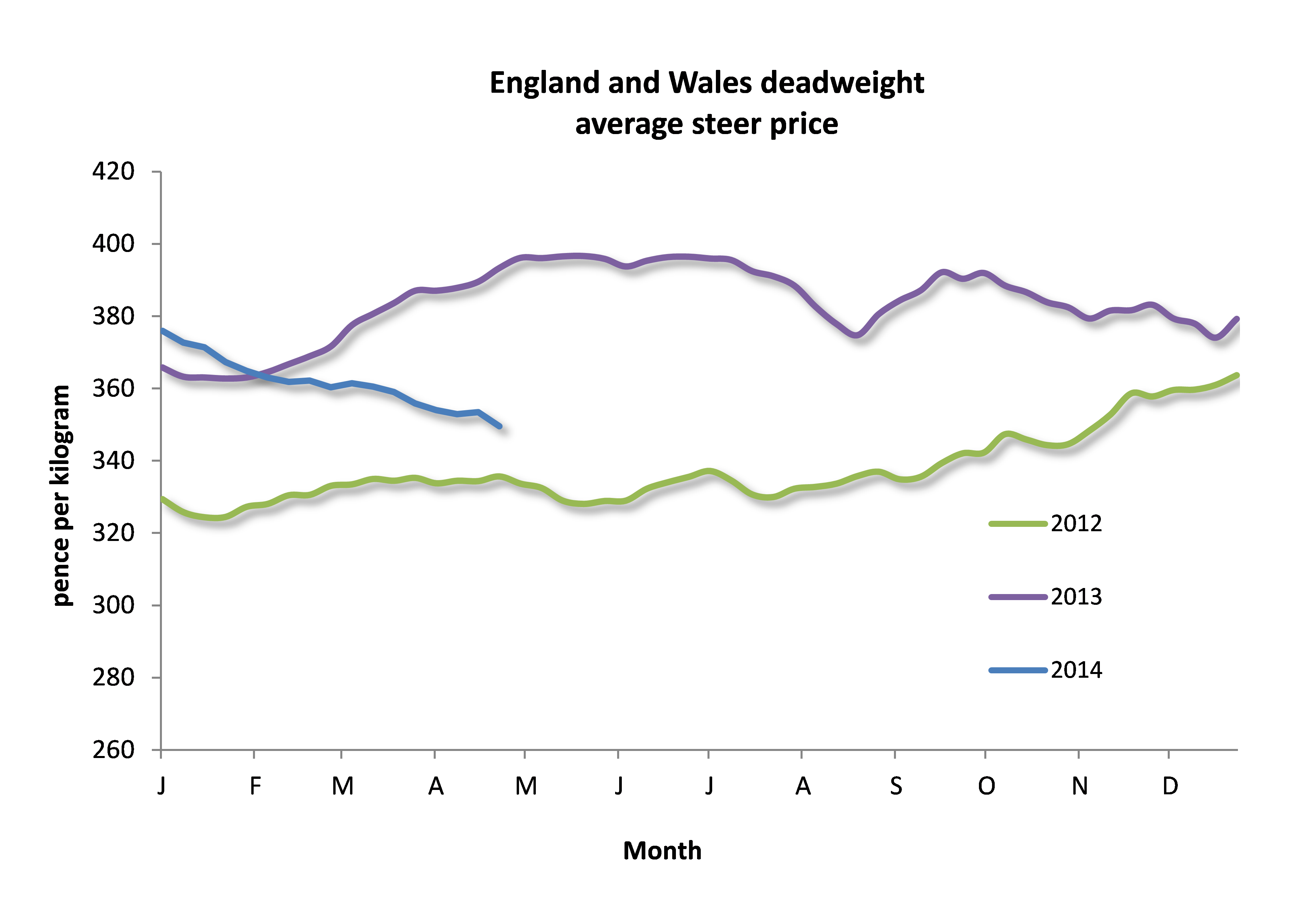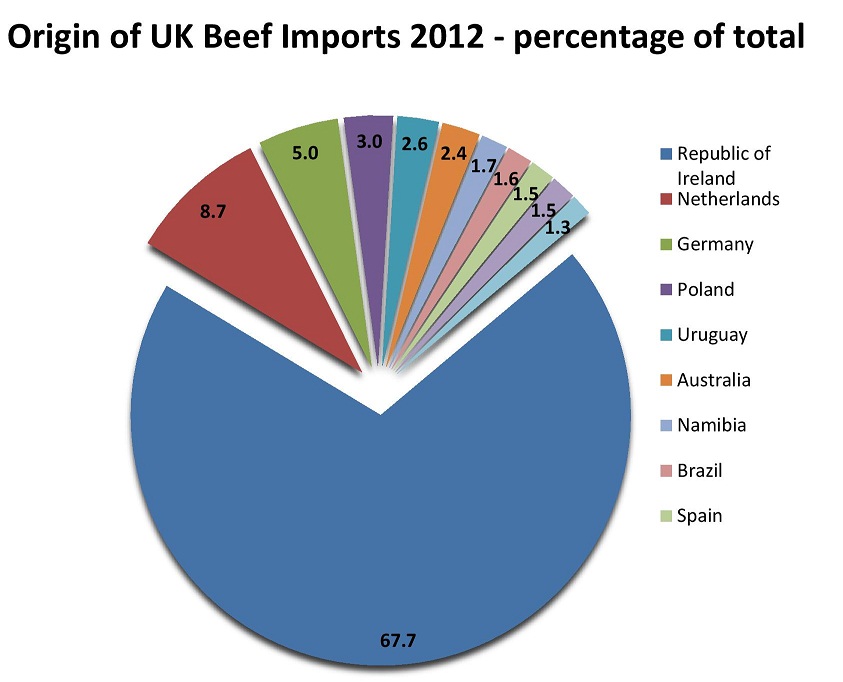Article by Alex Royan, National Assembly for Wales Research Service
The red meat sector as a whole (including beef and lamb products) contributes approximately some 40% to Welsh agricultural output. Its total value to the Welsh economy is estimated at more than £1billion annually and supports around 172,000 jobs, with in excess of £200 million worth of exports per year. The red meat industry is therefore vitally important to sustaining the rural economy in Wales. Fluctuations in red meat prices can have considerable implications across the supply chain, including for farmers, processors and retailers. On 12 May 2014, Hybu Cig Cymru (HCC) – the industry-led organisation responsible for developing, promoting and marketing Welsh red meat – announced a review into the future of the beef industry in Wales after the Welsh farming community raised concerns about recent falls in prices. Across Great Britain as a whole, since the beginning of 2014 the average deadweight steer price has declined steadily from a high of 384.2p per kg to a 346p per kg during the week ending 10 May. The value of deadweight steers is currently 54p per kg lower than in 2013; equivalent to a drop in income for the farmer of between £170 and £200 per steer. The following graph shows the trends in deadweight average steer prices for 2012-14 in England and Wales. Prices have dropped consistently thus far in 2014, yet the current price is still slightly higher than in the first half of 2012. [caption id="attachment_1786" align="alignnone" width="682"] Data source: HCC[/caption] According to HCC, the declines in price were caused by an increase in the UK’s supply of prime cattle and an increase in imports, as well as subdued consumer demand. Whilst in the first three months of the year the number of prime cattle passing through abattoirs increased by 1% compared to last year, there was a 7% drop in purchases, pointing towards an increased volume of supply. HCC Chief Executive Gwyn Howells said: “The HCC review will look at all options to ensure that the Welsh beef herd has a viable and sustainable long term future. It is in everyone’s interests – farmers, processors and retailers – to have a thriving beef industry in this country to satisfy the growing demand for high quality home-grown beef. All sections of the supply chain should work in harmony to achieve this aim.” The review will investigate whether the decline in Welsh beef prices might be influenced by an increase in imported Irish beef. Irish producers receive 310p per kg of beef and are a cheaper source of beef for processors. Beef imports increased in the first two months of 2014, especially from Republic of Ireland and the Netherlands. The Republic of Ireland is the largest source of imported beef in the UK by a considerable margin – in 2012, 159,800 tonnes of Irish beef were imported into the UK, representing over two-thirds of beef imports. The specific deadlines for the review have yet to be announced. The following pie chart shows the contribution of beef imports from the Republic of Ireland to the UK market relative to the other major sources of beef imports.
Data source: HCC[/caption] According to HCC, the declines in price were caused by an increase in the UK’s supply of prime cattle and an increase in imports, as well as subdued consumer demand. Whilst in the first three months of the year the number of prime cattle passing through abattoirs increased by 1% compared to last year, there was a 7% drop in purchases, pointing towards an increased volume of supply. HCC Chief Executive Gwyn Howells said: “The HCC review will look at all options to ensure that the Welsh beef herd has a viable and sustainable long term future. It is in everyone’s interests – farmers, processors and retailers – to have a thriving beef industry in this country to satisfy the growing demand for high quality home-grown beef. All sections of the supply chain should work in harmony to achieve this aim.” The review will investigate whether the decline in Welsh beef prices might be influenced by an increase in imported Irish beef. Irish producers receive 310p per kg of beef and are a cheaper source of beef for processors. Beef imports increased in the first two months of 2014, especially from Republic of Ireland and the Netherlands. The Republic of Ireland is the largest source of imported beef in the UK by a considerable margin – in 2012, 159,800 tonnes of Irish beef were imported into the UK, representing over two-thirds of beef imports. The specific deadlines for the review have yet to be announced. The following pie chart shows the contribution of beef imports from the Republic of Ireland to the UK market relative to the other major sources of beef imports.  The announcement of the review by HCC was well received by the Farmers’ Union for Wales (FUW). FUW Vice President Brian Thomas said that declines in receipts for steers were eroding farmers’ confidence in the industry and investment may be needed to ensure the long-term viability of the industry. In response to the general decline in prices, NFU Cymru said in February that the sustainability of the Welsh beef market was being threatened and that operators across the supply chain should do more to assist farmers. “The decline could not have come at a worse time, with production costs continuing to escalate on the back of increased feed and bedding costs, as a result of this winter’s bad weather,” said NFU Cymru county chairman for Clwyd Ivor Beech.
The announcement of the review by HCC was well received by the Farmers’ Union for Wales (FUW). FUW Vice President Brian Thomas said that declines in receipts for steers were eroding farmers’ confidence in the industry and investment may be needed to ensure the long-term viability of the industry. In response to the general decline in prices, NFU Cymru said in February that the sustainability of the Welsh beef market was being threatened and that operators across the supply chain should do more to assist farmers. “The decline could not have come at a worse time, with production costs continuing to escalate on the back of increased feed and bedding costs, as a result of this winter’s bad weather,” said NFU Cymru county chairman for Clwyd Ivor Beech.






